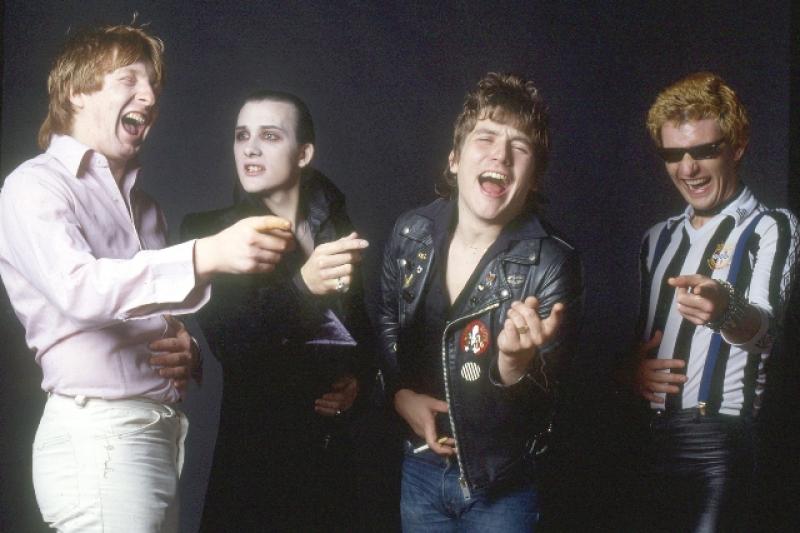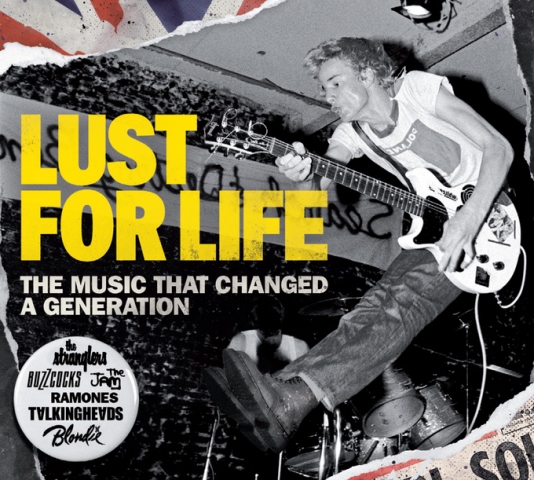Reissue CDs Weekly: Lust for Life | reviews, news & interviews
Reissue CDs Weekly: Lust for Life
Reissue CDs Weekly: Lust for Life
This self-declared official 40th anniversary of punk compilation misses the mark

Punk rock, or what’s touted as punk rock, is practically inescapable right now. In London, a series of events tagged as Punk.London: 40 Years of Subversive Culture includes concerts by reanimated bands, exhibitions and film seasons. Backers include the British Fashion Council, the British Film Institute and the Design Museum. The Mayor of London is an official supporter. Sponsorship has come from the Heritage Lottery Fund.
Joe Corré, the son of Sex Pistols’ manager Malcolm McLaren and founder of the pricey female underwear brand Agent Provocateur, has said Buckingham Palace is another of Punk.London’s supporters. He reacted by declaring “the Queen giving 2016, the year of punk, her official blessing is the most frightening thing I’ve ever heard. Talk about alternative and punk culture being appropriated by the mainstream. Rather than a movement for change, punk has become like a fucking museum piece or a tribute act.” As a protest, Corré has vowed to reduce his punk memorabilia, valued at £5 million, to ashes.
 The release of Lust for Life: The Music That Changed a Generation doesn’t merit such an extreme reaction but it does induce a deep sigh. It is marketed as “The Official Punk at 40 Album.” The press release says it “is a collection of 60 iconic punk and new wave hits of the era.” Nowhere is it revealed who has anointed it “official” and why it is “official”. The 3-CD digi-pack set has no booklet and no liner notes, so illumination isn't forthcoming. It is issued by the Universal Music Group Inc, “an American-French worldwide music corporation that operates as a subsidiary of Paris-based French media conglomerate Vivendi” (yes, the words following the comma in that last sentence are taken from Wikipedia).
The release of Lust for Life: The Music That Changed a Generation doesn’t merit such an extreme reaction but it does induce a deep sigh. It is marketed as “The Official Punk at 40 Album.” The press release says it “is a collection of 60 iconic punk and new wave hits of the era.” Nowhere is it revealed who has anointed it “official” and why it is “official”. The 3-CD digi-pack set has no booklet and no liner notes, so illumination isn't forthcoming. It is issued by the Universal Music Group Inc, “an American-French worldwide music corporation that operates as a subsidiary of Paris-based French media conglomerate Vivendi” (yes, the words following the comma in that last sentence are taken from Wikipedia).
Misgivings about Lust for Life are not related to it being the product of a multi-national corporate business. What had been called "punk" made its deal with that world the moment Sex Pistols signed with EMI in October 1976. The reservations stem from the baseless hubris, dodgy packaging and the tracklist. Just one track is from the year-zero which is the subject of the anniversary: The Ramones’ 1976 “Blitzkrieg Bop”. Sex Pistols do not appear. British punk’s first single, The Damned’s “New Rose”, is also absent (their 1979 single “Smash it up” is included). As the supposed “Official Punk at 40 Album”, Lust for Life comes up short on the 1976 front.
 It also stretches the limits of what it is to be an “iconic punk and new wave hit of the era” beyond breaking point. The Piranhas’ “Tom Hark” is new wave and iconic? Ditto Jona Lewie’s “You'll Always Find Me in the Kitchen at Parties” and The Motors’ “Airport”. The Cure are new wave? The rationale for choosing what appears is unfathomable and, without liner notes, it must remain so. The sequencing throughout is bizarre and jarring. Any lingering feelings of solemnity invoked by Magazine’s stately “Shot by Both Sides” are killed off when it is followed by fellow Mancunians Slaughter & the Dogs’ yob-punk anthem “Where Have All the Boot Boys Gone”. While great tracks are included, the selection appears to have been made by playing blind man’s buff with what was in the charts from 1977 to 1981. Taste and perception may define what is punk or new wave, but Lust for Life emphatically misses the mark.
It also stretches the limits of what it is to be an “iconic punk and new wave hit of the era” beyond breaking point. The Piranhas’ “Tom Hark” is new wave and iconic? Ditto Jona Lewie’s “You'll Always Find Me in the Kitchen at Parties” and The Motors’ “Airport”. The Cure are new wave? The rationale for choosing what appears is unfathomable and, without liner notes, it must remain so. The sequencing throughout is bizarre and jarring. Any lingering feelings of solemnity invoked by Magazine’s stately “Shot by Both Sides” are killed off when it is followed by fellow Mancunians Slaughter & the Dogs’ yob-punk anthem “Where Have All the Boot Boys Gone”. While great tracks are included, the selection appears to have been made by playing blind man’s buff with what was in the charts from 1977 to 1981. Taste and perception may define what is punk or new wave, but Lust for Life emphatically misses the mark.
Examination of the cover confirms this should be no surprise. A photo of a leaping guitarist is superimposed on a Union Jack backdrop. It would not be unreasonable for the American bands included to be put out by this. Closer scrutiny reveals worse. The words on the banner behind the guitarist are seen in mirror image. The reversed cover picture is of Chip Kinman, of Californian punk band Dils, and was taken at a benefit for San Francisco’s Search & Destroy magazine on 11 May 1978: the banner says “Search & Destroy benefit.” The image first appeared on the cover of issue seven of Search & Destroy (pictured above left) and the photographer is Ruby Ray who, more recently, has published a book of her punk-era photos. In the original shot, Kinman is wearing hi-tops. The re-rendered Lust for Life version not only flips the image but also alters it so he is digitally transformed to be seen wearing Doctor Martens. Why this defacement? Surprisingly, the package does not credit the picture. Dils do not appear on the compilation.
The mendacious cover image of Lust for Life rewrites history. On second thoughts, perhaps Joe Corré might want it for his bonfire? As to what Kinman and Ray think of their involvement, has anyone at Universal asked them?
Share this article
The future of Arts Journalism
You can stop theartsdesk.com closing!
We urgently need financing to survive. Our fundraising drive has thus far raised £49,000 but we need to reach £100,000 or we will be forced to close. Please contribute here: https://gofund.me/c3f6033d
And if you can forward this information to anyone who might assist, we’d be grateful.

Subscribe to theartsdesk.com
Thank you for continuing to read our work on theartsdesk.com. For unlimited access to every article in its entirety, including our archive of more than 15,000 pieces, we're asking for £5 per month or £40 per year. We feel it's a very good deal, and hope you do too.
To take a subscription now simply click here.
And if you're looking for that extra gift for a friend or family member, why not treat them to a theartsdesk.com gift subscription?
more New music
 Album: Nova Twins - Parasites & Butterflies
Exciting London duo turn inward and more introspective with their third album while retaining their trademark hybrid sound
Album: Nova Twins - Parasites & Butterflies
Exciting London duo turn inward and more introspective with their third album while retaining their trademark hybrid sound
 Music Reissues Weekly: The Beatles - What's The New, Mary Jane
John Lennon’s queasy, see-sawing oddity becomes the subject of a whole album
Music Reissues Weekly: The Beatles - What's The New, Mary Jane
John Lennon’s queasy, see-sawing oddity becomes the subject of a whole album
 The Maccabees, Barrowland, Glasgow review - indie band return with both emotion and quality
The five-piece's reunion showed their music has stood the test of time.
The Maccabees, Barrowland, Glasgow review - indie band return with both emotion and quality
The five-piece's reunion showed their music has stood the test of time.
 Album: Blood Orange - Essex Honey
A triumph for the artist who doesn't clamour for attention but just keeps growing
Album: Blood Orange - Essex Honey
A triumph for the artist who doesn't clamour for attention but just keeps growing
 Houghton / We Out Here festivals review - an ultra-marathon of community vibes
Two different but overlapping flavours of subculture full of vigour
Houghton / We Out Here festivals review - an ultra-marathon of community vibes
Two different but overlapping flavours of subculture full of vigour
 Album: Wolf Alice - Clearing
Ten years from their debut, Wolf Alice once again make magic from the familiar
Album: Wolf Alice - Clearing
Ten years from their debut, Wolf Alice once again make magic from the familiar
 Album: Deftones - Private Music
Deftones give us a glimmer of hope, but that's all...
Album: Deftones - Private Music
Deftones give us a glimmer of hope, but that's all...
 Album: Eve Adams - American Dust
Taking inspiration from the Californian desert
Album: Eve Adams - American Dust
Taking inspiration from the Californian desert
 Gibby Haynes, O2 Academy 2, Birmingham review - ex-Butthole Surfer goes School of Rock
Butthole Surfers’ frontman is still flying his freak flag but in a slightly more restrained manner
Gibby Haynes, O2 Academy 2, Birmingham review - ex-Butthole Surfer goes School of Rock
Butthole Surfers’ frontman is still flying his freak flag but in a slightly more restrained manner
 Album: Adrian Sherwood - The Collapse of Everything
The dub maestro stretches out and chills
Album: Adrian Sherwood - The Collapse of Everything
The dub maestro stretches out and chills
 Music Reissues Weekly: The Residents - American Composer's Series
James Brown, George Gershwin, John Philip Sousa and Hank Williams as seen through an eyeball-headed lens
Music Reissues Weekly: The Residents - American Composer's Series
James Brown, George Gershwin, John Philip Sousa and Hank Williams as seen through an eyeball-headed lens
 Album: Dinosaur Pile-Up - I've Felt Better
Heavy rock power pop trio return after an unwanted lengthy break
Album: Dinosaur Pile-Up - I've Felt Better
Heavy rock power pop trio return after an unwanted lengthy break

Add comment